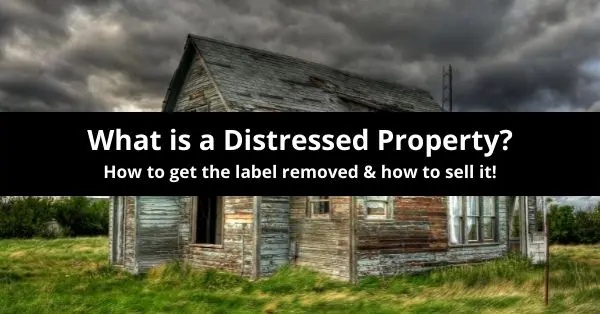A distressed property is a home where the homeowner has fallen behind on a few (usually three) mortgage payments to their lender, or there is an impending lawsuit coming to the property. When this happens, the lender may take steps to protect themselves from a financial loss by filing a “lis pendens” notice on the title of the home. The lis pendens notice is filed in the county records where the property is located. And that is how you find if a property is in fact a distressed property. But late payments aren’t the only way a property becomes distressed.
Someone from your lender’s office may simply drive by and feel you’ve let the property go and it is damaged. During a divorce or if there is a clouded title, your home can be considered a distressed property based on the specific situation. And in some instances, severe damage to the property like a broken roof or damaged foundation will wind you up with a distressed property label. But your lender is likely the most common reason for you to have the distressed property label placed on your home.
If your lender has designated your home as distressed, don’t panic. You have several options to get the label removed from your home. Before we jump into that, lets look at what makes your house distressed and learn about who can and cannot apply this label to your home.
What Makes Your Home Distressed?
Your property is considered distressed if a lis pendens has been filed on its title. A lis pendens is a notice that is recorded with the County recorder’s office that tells buyers and lenders that there may be a potential lawsuit coming to the homeowner from their lender and it could result in the loss of the house or even foreclosure.
Who Can Label Your House as a Distressed Property?
Court appointed attorneys or court authorized employees of your lender are the people and organizations that can file a lis pendens notice on your title.
If your house gets labeled as a distressed property, you have options to fix the problem which we cover a bit later.
Why Would Your Lender Consider Your Home Distressed?
Your lender may consider your home distressed if:
- They have a lis pendens has been filed in the county record of title.
- There is no active and paid home owners’ insurance policy.
- Your home does not have water, electricity or heat.
- It is found your house violates municipal regulations for safety.
- They feel there is a financial risk to their stake in your home.
Will Being Labeled a Distressed Property Affect My Home’s Value?
No, your property value is not affected by being labeled a distressed property, but the label can be a turn off for buyers and potentially reduce the amount you get in an offer. This is normally because the phrase “distressed property” has a negative connotation.
When buyers, investors and others find out your house has been labeled a distressed property, they may also feel you are desperate to sell your home and assume you may accept a low offer. However, you are still the owner of your property, and you are free to accept or reject any and all offers. And if the buyer does not do their research then they may assume there is something wrong with a “distressed property” as the term sounds scarier than it actually is.
How Do Investors and Buyers Know My Home Is Distressed?
Investors and home buyers will know your property is distressed when they see a lis pendens on your title in the county records, or they see it published on popular internet sites in the “distressed properties lists”. Realtors also have lists of distressed homes created by the MLS (Multiple Listing Service) which they may share with their clients.
How Can You Get the Distressed Property Designation Removed?
You can get the distressed property designation removed by doing the following:
Communication & Negotiation
Keep communicating with your lender. Let them know what problems you faced that got you behind in payments and what you are doing to get back up-to-date. Try to restore their confidence in you. If you can regain their trust and work out a payment plan, your lender may not feel the need to keep the lis pendens notice on your title and this removes the distressed property label.
Pay Your Missed Payments
Paying missed payments may not be as difficult as it sounds. If you have a credit card with available credit, you can use that available credit to get up to date. You can ask family to help you get caught up. If you have two cars, sell one and use the cash to make your back payments. You can also ask your lender to accept a lower repayment plan for the back payments.
Refinance Your Mortgage
You may be able to pay off your mortgage by getting a new one through refinancing. The new interest rates and longer payment schedule may reduce your monthly payments to a more affordable level even though you’ll be paying them for a longer period of time.
Sell Your Home
Selling your home is another option. If your home is in excellent condition you could sell through a Realtor, but that can require expensive agent commissions and closing costs. If your home needs repairs, or there is an impending foreclosure, you may not have the time or money to wait for a traditional sale.
If you just want to be done quickly and without stress, you may do better with a company like ours where you can sell your house fast and for cash.
We will visit your home, create a comp (what other similar properties in your area with similar obstacles are work), and get you an offer fast.
By selling to us you save extra money because we cut out the middle-people letting you avoid some expenses including:
- mortgage interest
- taxes
- homeowner association fees
- maintenance
And now you know what a distressed property is, who can label your home as a distressed property, and how to get the distressed property label removed from your home. If you’d like to talk to someone about distressed properties or get a quote to see how much we’ll pay for your house, call us at .


